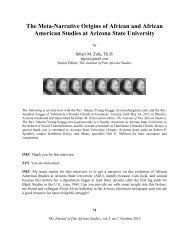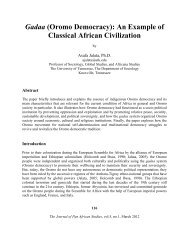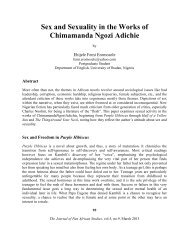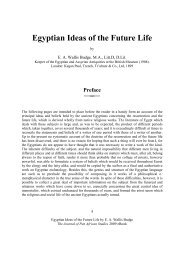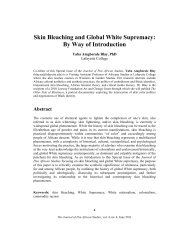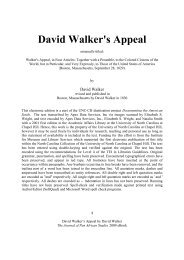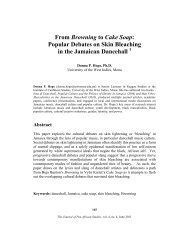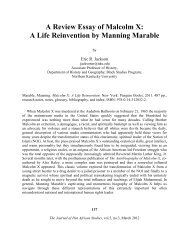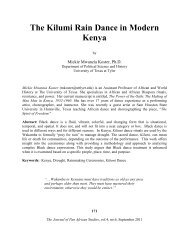Pragma-criticism: An Afrieurocentric Reaction to the Bolekaja ...
Pragma-criticism: An Afrieurocentric Reaction to the Bolekaja ...
Pragma-criticism: An Afrieurocentric Reaction to the Bolekaja ...
You also want an ePaper? Increase the reach of your titles
YUMPU automatically turns print PDFs into web optimized ePapers that Google loves.
<strong>Pragma</strong>-<strong>criticism</strong>: <strong>An</strong> <strong>Afrieurocentric</strong><br />
<strong>Reaction</strong> <strong>to</strong> <strong>the</strong> <strong>Bolekaja</strong> Agenda on <strong>the</strong> African Novel<br />
by<br />
Afolayan, S. Olusola<br />
afolayanhod@yahoo.com<br />
Department of English, University of Ado Ekiti<br />
Ado Ekiti, Nigeria<br />
Abstract<br />
The trio of Chinweizu, Onwuchekwa Jemie and Ihechukwu Madubuike call <strong>the</strong>mselves <strong>the</strong><br />
<strong>Bolekaja</strong> critics in <strong>the</strong>ir unabashedly polemical book, Toward <strong>the</strong> Decolonization of African<br />
Literature, stating, “…we are <strong>Bolekaja</strong> critics, outraged <strong>to</strong>uts for <strong>the</strong> passenger lorries of African<br />
literature”. In this book, <strong>the</strong> Troika (as <strong>the</strong>y are also called) claim that <strong>the</strong>ir mission is <strong>to</strong> rescue<br />
Africa’s prose literature from <strong>the</strong> dominant Eurocentric <strong>criticism</strong>. Because of certain<br />
misconceptions traced <strong>to</strong> <strong>the</strong> ideology of <strong>the</strong> three writers, <strong>the</strong> book was summarily out-modeled.<br />
However, it is clear that in spite of its no<strong>to</strong>riety, <strong>the</strong> book could not be easily forgotten as it<br />
subjects <strong>the</strong> tendentious Eurocentricism <strong>to</strong> <strong>the</strong> mercy of <strong>the</strong> rampaging African centered position.<br />
This essay, though not extremely Afrocentric in position, stemmed from <strong>the</strong> need <strong>to</strong> curb <strong>the</strong><br />
excessive and indiscriminate (mis)application of Western <strong>the</strong>ories <strong>to</strong> <strong>the</strong> generality of African<br />
literature. This supposed “misappropriation” of literary <strong>the</strong>ory accounts for why <strong>the</strong> African<br />
novel has become a victim of <strong>the</strong> Eurocentric <strong>the</strong>ories that have often been mis-contextually<br />
applied. This has resulted in <strong>the</strong> problem of “misidentity” and “wrong” definition for <strong>the</strong> genre.<br />
For instance, while <strong>the</strong> Western novel is marked by certain structural changes at each stage of its<br />
transformation from Defoe <strong>to</strong> <strong>the</strong> post-Conrad period of its development, <strong>the</strong> African novel is<br />
conservatively un-absorbing <strong>to</strong> major structural changes. This is because <strong>the</strong> genre is not well<br />
defined by linguistics, but also by its context of content which is perhaps what explains <strong>the</strong><br />
similarity between most African novels. It is basically in recognition of this that we have<br />
identified pragma-<strong>criticism</strong>, a conception which encapsulates context-sensitive prognostic<br />
critical <strong>to</strong>ols for <strong>the</strong> <strong>criticism</strong> of <strong>the</strong> African novel. This is an attempt at <strong>the</strong> identification of<br />
social and <strong>the</strong> his<strong>to</strong>rical-political conditions that brand <strong>the</strong> aes<strong>the</strong>tics for <strong>the</strong> African novelist.<br />
85<br />
The Journal of Pan African Studies, vol.3, no.10, September 2010
We must approach African literature with an insight in<strong>to</strong>, and<br />
a feeling for, those aspects of African life which stand beyond<br />
<strong>the</strong> work itself, its extension in<strong>to</strong> <strong>the</strong> African experience, and<br />
its foundation in<strong>to</strong> <strong>the</strong> very substance of African<br />
existence….This approach, in its fullest and widest meaning,<br />
implies that our <strong>criticism</strong> should take in<strong>to</strong> account everything<br />
that has gone in<strong>to</strong> <strong>the</strong> work, and specifically for our literature;<br />
everything within our society which has informed <strong>the</strong> work….<br />
- Abiola Irele<br />
Introduction<br />
Abiola Irele’s pronouncement used epigrammatically as a scaffold for this essay is a<br />
reminiscence of <strong>the</strong> influence of <strong>the</strong> Afrocentric movement on <strong>the</strong> African literature. Afrocentric<br />
reasoning has led <strong>to</strong> various attempts <strong>to</strong> dislodge <strong>the</strong> literature from <strong>the</strong> canonical influences of<br />
<strong>the</strong> Western literary tradition and <strong>criticism</strong>. This has indubitably divided <strong>the</strong> critics of African<br />
literature in<strong>to</strong> two broad camps. While some – Izevbaye (1969), Palmer (1981) and Oyegoke<br />
(2003) for instance – advance <strong>the</strong> argument that any conscious attempt <strong>to</strong> break African literature<br />
away from <strong>the</strong> <strong>the</strong>oretical postulates of Western <strong>criticism</strong>s will amount <strong>to</strong> a suicidal<br />
dismemberment from <strong>the</strong> unified body of literary activities, o<strong>the</strong>rs like Ngara, Iyasere, Nnolim,<br />
Achebe et cetera strongly defend <strong>the</strong> need <strong>to</strong> discourage <strong>the</strong> pseudo-universalist’s critical<br />
approximations of African literature by <strong>the</strong> damaging encrustations of <strong>the</strong> imperialists. These<br />
opposing dispositions have resulted in<strong>to</strong> a palpable gulf between <strong>the</strong> critics of African literature<br />
<strong>to</strong> whom we refer (like <strong>the</strong> <strong>Bolekaja</strong>) as ei<strong>the</strong>r “Eurocentric” or “Afrocentric” critics. The<br />
Eurocentric critics of African literature are those who exhibit Western literary attitude in <strong>the</strong>ir<br />
approach <strong>to</strong> <strong>the</strong> literature. Their critical practice places African literature in a literary realm<br />
where its aes<strong>the</strong>tics is evaluated with <strong>the</strong> postulates of <strong>the</strong> Western critical <strong>the</strong>ories. The<br />
Afrocentic African critics are, however, those who advocate literary/critical au<strong>to</strong>nomy for <strong>the</strong><br />
African literature. These critics, most of whom are radical African intellectuals, often seek <strong>to</strong><br />
rescue African literature from <strong>the</strong> dominance of Western literary <strong>the</strong>ories.<br />
The genesis of a critical African perspective in <strong>the</strong> <strong>criticism</strong> of <strong>the</strong> African literature dates back<br />
<strong>to</strong> <strong>the</strong> desire among <strong>the</strong> African elites <strong>to</strong> liberate <strong>the</strong> literature from <strong>the</strong> poly-dialectic <strong>criticism</strong>s<br />
of Western aes<strong>the</strong>tics. Afrocentric African critics, <strong>the</strong>refore, seem <strong>to</strong> recommend <strong>the</strong><br />
‘Africanized’ <strong>to</strong>ols for African literature. This is, perhaps, as a result of <strong>the</strong> bid <strong>to</strong> puncture <strong>the</strong><br />
inflated dominance of <strong>the</strong> Eurocentrically governed prejudices which have viewed African<br />
literature as an appendage of its Western counterpart.<br />
86<br />
The Journal of Pan African Studies, vol.3, no.10, September 2010
<strong>An</strong>adolu-Okur however tells us that Afrocentricity had developed as “a paradigm which<br />
recognizes <strong>the</strong> centrality of African ideals in African phenomenon since 1960’s in <strong>the</strong> Black<br />
American literary foundations” (1993:88). This no doubt takes <strong>the</strong> foundations beyond <strong>the</strong><br />
<strong>Bolekaja</strong> critics who employed <strong>the</strong> term <strong>to</strong> “grind axes” with <strong>the</strong> like of Soyinka and Izevbaye.<br />
In a broader term, <strong>the</strong> African perspective “calls for a redefinition or elimination of certain terms<br />
that connote racism and prejudice” (<strong>An</strong>adolu-Okur, 1993:98). There is no doubt that <strong>the</strong><br />
<strong>Bolekaja</strong> critics <strong>the</strong>mselves are mere apostles of <strong>the</strong> ideology. The <strong>Bolekaja</strong>’s radical dimension<br />
<strong>to</strong> an African centered perspective revolutionized <strong>the</strong> <strong>criticism</strong> of African literature and it has<br />
since become apparent that <strong>the</strong> ideological gulf between <strong>the</strong> African centered and Euro-centered<br />
has come <strong>to</strong> stay.<br />
The aligning tendency with <strong>the</strong> African centered as may be exhibited here does not suggest a<br />
<strong>to</strong>tal repudiation of Western literary <strong>the</strong>ories. Hence we do not intend <strong>to</strong> adopt <strong>the</strong> brutish<br />
techniques of absolutists like <strong>the</strong> ‘Troika’ (who rained “pettifogging abuses” on almost all <strong>the</strong><br />
African apologists of <strong>the</strong> Western critical dogma) here. Even as we say that <strong>the</strong> trio of<br />
Chinweizu, Jemie and Madubuike are quite useful in <strong>the</strong> Afrocentric renaissance, <strong>the</strong>ir radical<br />
suggestions on African novel as having its matrix in <strong>the</strong> pre-novelistic African verbal form will<br />
not be wholly acceptable. This is mainly because of <strong>the</strong>ir failure <strong>to</strong> provide ample codification<br />
for <strong>the</strong>ir suggestions. One major flaw of <strong>the</strong>ir ideology lies in, according <strong>to</strong> Nnolim, <strong>the</strong>ir failure<br />
<strong>to</strong> recommend <strong>the</strong> expected standard for <strong>the</strong> <strong>criticism</strong> of <strong>the</strong> African literature especially since<br />
<strong>the</strong>ir intention had been <strong>to</strong> abrogate any form of consanguineous relationship between <strong>the</strong><br />
literature and <strong>the</strong> Western interpretative machinery.<br />
Despite its flaws, <strong>Bolekaja</strong>ism inexorably started <strong>the</strong> crusade that labeled many of <strong>the</strong> critics of<br />
African literature as <strong>to</strong>o <strong>the</strong>oretical and Eurocentric in <strong>the</strong>ir approaches <strong>to</strong> <strong>the</strong> literature. Though<br />
we agree that Chinweizu and his friends were right in <strong>the</strong>ir opinion that many critics of African<br />
literature “habitually view African literature though European eyes”, it is worthy <strong>to</strong> mention that<br />
<strong>the</strong>ir inability <strong>to</strong> device and define <strong>the</strong> critical poetics of African literature obviously sent <strong>the</strong>ir<br />
argument <strong>to</strong> <strong>the</strong> archives (Chinweizu et al 1980:03). As <strong>the</strong>ir idea suffered a monumental set<br />
back, Nnolim could not help crying out that:<br />
For <strong>the</strong> moment we urgently need our own version of Northrop Frye <strong>to</strong><br />
pen for us <strong>the</strong> <strong>An</strong>a<strong>to</strong>my of “African” <strong>criticism</strong>; we need our I.A Richards<br />
<strong>to</strong> write us Principles of ‘African’ <strong>criticism</strong>; we need our own T.C Pollock<br />
<strong>to</strong> write us <strong>the</strong> Nature of ‘African’ literature; we need our own Welleck<br />
and Warren <strong>to</strong> write us our own Theory of ‘African’ literature. (1986:30)<br />
87<br />
The Journal of Pan African Studies, vol.3, no.10, September 2010
It is <strong>the</strong>refore hoped that this essay will answer Nnolim’s prayer as it intends <strong>to</strong> articulate <strong>the</strong><br />
basics of <strong>the</strong> <strong>criticism</strong> of African literature, with a view <strong>to</strong> recommending <strong>the</strong> critical <strong>to</strong>ols<br />
suitable for <strong>the</strong> African novel.<br />
The Afrocentric view in <strong>the</strong> <strong>criticism</strong> of African literature started <strong>to</strong> gain momentum when it<br />
seemed <strong>the</strong> literature could not achieve any literary independence. It also seemed that African<br />
works with influences from Western forms could not be <strong>to</strong>tally insulated from <strong>the</strong> critical<br />
reflexes of Western <strong>criticism</strong>. This resulted in<strong>to</strong> <strong>the</strong> violent call for a unique African<br />
aes<strong>the</strong>tic/critical poetics <strong>to</strong> cater for <strong>the</strong> need of African literature. Izevbaye throws more light on<br />
this:<br />
The call for an African aes<strong>the</strong>tics was first made in <strong>the</strong> fifties as part of <strong>the</strong><br />
larger political emancipation which was sweeping <strong>the</strong> continent at that<br />
time. The first international congress of Negro writers and artists which<br />
was held in Paris in 1956 had as its <strong>the</strong>me “The Crisis in Negro Culture”<br />
and was much concerned with <strong>criticism</strong>. At <strong>the</strong> congress literature was<br />
considered only as one of many disciplines which <strong>the</strong> participants put<br />
forward as part of African studies <strong>to</strong> be emphasized and improved in <strong>the</strong><br />
fight for cultural freedom and rehabilitation of <strong>the</strong> black man on <strong>the</strong> world<br />
scene (1968:04).<br />
Sequel <strong>to</strong> this, conferences and congresses of African, African-American and Afro-Caribbean<br />
writers and critics were staged <strong>to</strong> examine <strong>the</strong> positive, or negative, impacts of <strong>the</strong> drive for a<br />
unique black critical aes<strong>the</strong>tics. According <strong>to</strong> Fashina “<strong>the</strong> 1980’s marked a decisive phase in <strong>the</strong><br />
evolution of African literary <strong>the</strong>ory” and coordinated efforts have been made “and are still being<br />
made <strong>to</strong> forge a distinct critical poetics of African works” (1993:51). Writers like Henry Loius<br />
Gates Jr, Ayi Kwei Armah, Chidi Amuta, Sunday <strong>An</strong>ozie and a host of o<strong>the</strong>rs have advanced<br />
arguments in favour of Afrocentric <strong>criticism</strong>.<br />
The <strong>Bolekaja</strong> Agenda and Eurocentric Logic<br />
The elusive nature of <strong>the</strong> <strong>criticism</strong> of <strong>the</strong> African novel has led <strong>to</strong> an intellectual war among <strong>the</strong><br />
critical intelligentsia. Hence, <strong>the</strong>re has been a clear-cut distinction between those who believe<br />
that <strong>the</strong> idea of an African critical aes<strong>the</strong>tics is absurd especially since <strong>criticism</strong> should be<br />
<strong>criticism</strong> and modern aes<strong>the</strong>tics of literature is expected <strong>to</strong> be scientific and based on general<br />
principles accepted as crucial <strong>to</strong> all literatures of <strong>the</strong> world; and those who share <strong>the</strong> opinion that<br />
“<strong>the</strong>re is <strong>the</strong> need <strong>to</strong> devise a <strong>criticism</strong> adequate <strong>to</strong> African literature” (James, African Literature<br />
Today 7, 147).<br />
88<br />
The Journal of Pan African Studies, vol.3, no.10, September 2010
The <strong>Bolekaja</strong> critics did not take lightly <strong>the</strong> parochial assumption that “<strong>criticism</strong> is<br />
<strong>criticism</strong>” as this is evident in <strong>the</strong>ir proposition that:<br />
…African literature is an au<strong>to</strong>nomous entity separate and apart from all o<strong>the</strong>r<br />
literatures. It has its own traditions, models and norms. Its constituency is separate<br />
and radically different from that of <strong>the</strong> European or o<strong>the</strong>r literatures (p4).<br />
Consequently, <strong>the</strong>y observe that <strong>the</strong> seeming universality of <strong>the</strong> Western literary canon must not<br />
be allowed <strong>to</strong> extend beyond <strong>the</strong> manageable limit in <strong>the</strong> domain of <strong>the</strong> African literature.<br />
It is worthy <strong>to</strong> mention here that <strong>the</strong> misconceived universality of <strong>the</strong> Western critical<br />
dogma lies in its claim <strong>to</strong> possess a scientific praxis <strong>to</strong> all literatures. This is perhaps <strong>the</strong> basis for<br />
<strong>the</strong> Eurocentric belief in <strong>the</strong> universal relevance of <strong>the</strong> Western critical <strong>the</strong>ories. However,<br />
Larson, one of <strong>the</strong> foremost white critics of African literature, surprisingly, sees <strong>the</strong> situation<br />
differently. He says:<br />
But <strong>the</strong> Western critic [or his Eurocentric African disciples] has not been<br />
completely fair in his evaluation of African writing if he has been content<br />
<strong>to</strong> limit his approach <strong>to</strong> linguistics alone... (1971:12)<br />
Larson has <strong>the</strong>refore, identified that apart from <strong>the</strong> extreme science-centered focus of Western<br />
<strong>criticism</strong>, often grounded on <strong>the</strong> extended study of <strong>the</strong> language of literature, <strong>the</strong> Africans’ use of<br />
Western language – English, French and Portuguese – in <strong>the</strong>ir writings has always misled <strong>the</strong><br />
Western literary <strong>the</strong>orist <strong>to</strong> erroneously believe in <strong>the</strong> centrality of his <strong>the</strong>oretical <strong>to</strong>ols in <strong>the</strong><br />
analysis of African literature. This, <strong>the</strong> <strong>Bolekaja</strong> agenda has questioned.<br />
Achebe in his essay, “Colonialist Criticism”, castigates <strong>the</strong> colonial critic who he believes is<br />
arrogant, and according <strong>to</strong> Ngara, “Achebe advises <strong>the</strong> European critic of African literature <strong>to</strong><br />
cultivate humility and get rid of his air of superiority and arrogance” (1982:04). Achebe assumes<br />
a position that “we are not opposed <strong>to</strong> <strong>criticism</strong> but we are getting a little weary of all special<br />
types of <strong>criticism</strong> which have been designed for us by people whose knowledge of us is limited”<br />
(1975:79). Achebe’s idea of “special <strong>criticism</strong>” simply refers <strong>to</strong> <strong>the</strong> various <strong>the</strong>ories from <strong>the</strong><br />
Western traditions which have inundated <strong>the</strong> canon of African literature.<br />
89<br />
The Journal of Pan African Studies, vol.3, no.10, September 2010
In “Where <strong>An</strong>gels Fear <strong>to</strong> Tread”, Achebe posits that “<strong>the</strong> question is not whe<strong>the</strong>r we should be<br />
criticized or not, but what kind of <strong>criticism</strong>?” (1975:07). <strong>An</strong>d in <strong>the</strong> same essay, Achebe<br />
categorizes <strong>the</strong> critics of African literature in<strong>to</strong> three: <strong>the</strong> hostile critics; <strong>the</strong> critics who are not<br />
comfortable that Africans can write in English (or French and Portuguese) <strong>to</strong>o; and critics who<br />
say that African writers should be judged by Western standards.<br />
To <strong>the</strong>se three we have already added <strong>the</strong> <strong>Bolekaja</strong> critics who believe that <strong>the</strong> canon of <strong>the</strong><br />
Western literary <strong>the</strong>ories cannot adequately cater for <strong>the</strong> critical needs of <strong>the</strong> African literature.<br />
Achebe is <strong>the</strong>refore not comfortable with <strong>the</strong> claim by <strong>the</strong> European and American critics <strong>to</strong><br />
know <strong>to</strong>o much about Africa, “when in actual fact <strong>the</strong>y do not understand <strong>the</strong> African world view<br />
and cannot [even] speak African languages” (Ngara 1982:04).<br />
Fur<strong>the</strong>rmore, in maintaining <strong>the</strong> need and necessity <strong>to</strong> explore <strong>the</strong> possibility of devising critical<br />
poetics of African art, Gates (1986) accepts:<br />
I once thought it our most important gesture <strong>to</strong> master <strong>the</strong> canon of<br />
[Western] <strong>criticism</strong>, <strong>to</strong> initiate and apply it. But, I believe that we must<br />
turn <strong>to</strong> <strong>the</strong> black tradition itself <strong>to</strong> develop <strong>the</strong>ories of <strong>criticism</strong> indigenous<br />
<strong>to</strong> our literature (20).<br />
This view was buttressed by Abiola Irele when he admitted that a Eurocentric attitude “doesn’t<br />
make you African; it displaces you” (“Literature, Culture, and Thought in Africa: A<br />
Conversation with Abiola Irele). This statement was made when Irele, in an interview with<br />
Na’Allah was attesting <strong>to</strong> <strong>the</strong> inescapable Eurocentric education made available <strong>to</strong> <strong>the</strong> generation<br />
of <strong>the</strong> fresh elites, adding:<br />
… coming <strong>to</strong> our education, you’re right <strong>to</strong> say it was Eurocentric. In my<br />
case, it was decidedly so, because I grew up a Catholic... It was after all<br />
<strong>the</strong> only one available <strong>to</strong> us at that time.... Those of us who also received<br />
that colonial education; and I include people like Chinua Achebe and<br />
Wole Soyinka. We had <strong>to</strong> rediscover our African background ourselves. It<br />
is very important <strong>to</strong> bear in mind that we had <strong>to</strong> come back and relearn our<br />
own traditions – sometimes even <strong>to</strong> tell <strong>the</strong> truth, relearn our own<br />
language. (“Literature, Culture, and Thought in Africa: A Conversation<br />
with Abiola Irele”)<br />
90<br />
The Journal of Pan African Studies, vol.3, no.10, September 2010
The implication of this is that <strong>the</strong> beginning, for <strong>the</strong> African elite was unavoidably Eurocentric<br />
and we cannot deny <strong>the</strong> facts that <strong>the</strong> first generation of African writers were influenced by <strong>the</strong><br />
Europeans. This influence, no doubt reflects in Achebe’s inspiration <strong>to</strong> draw <strong>the</strong> title of his<br />
seminal novel, Things Fall Apart from W.B. Yeats’ poem “The Second Coming”, and that of his<br />
second, No Longer at Ease from T.S Eliot’s “Journey of The Magi”. This is perhaps why <strong>the</strong><br />
English critic logically considers <strong>the</strong>se novels and o<strong>the</strong>rs like <strong>the</strong>m, as extensions of <strong>the</strong> English<br />
literary domain. Ngara explains fur<strong>the</strong>r that even in Soyinka’s poetry collections, A shuttle in <strong>the</strong><br />
Crypt, <strong>the</strong>re are at least four poems whose titles are derived from archetypal figures found in<br />
European literature and <strong>the</strong> Bible: Joseph, Hamlet, Gulliver and Ulysses. Even some of <strong>the</strong><br />
writers using indigenous African languages have been influenced by European literature<br />
(1987:07). However, Achebe and <strong>the</strong> o<strong>the</strong>r Afrocentric critics still hold on <strong>to</strong> <strong>the</strong>ir African roots.<br />
Armah virulently reacted <strong>to</strong> Larson’s opinion about African works and he, in “Larsony of<br />
Fictions as Criticism of Fiction”, opposes those Western critical dogmas “which consist of <strong>the</strong><br />
traditional dis<strong>to</strong>rtion of African truth <strong>to</strong> fit Western prejudices” (New Classic No 4 p 8) and he<br />
hurriedly brings <strong>the</strong> question which seeks <strong>to</strong> know <strong>the</strong> appropriateness of <strong>the</strong> Western critical<br />
<strong>the</strong>ories in <strong>the</strong> analysis of African literature <strong>to</strong> mind. Armah believes that Western critics have<br />
taken many things for granted, which forces <strong>the</strong>m <strong>to</strong> make wrong assumptions<br />
For long, many African scholars of Western literature relied on <strong>the</strong> critical axioms supplied by<br />
<strong>the</strong> Western <strong>the</strong>orists. The case was <strong>the</strong> same for African literature as <strong>the</strong> literature has often<br />
been made bendable <strong>to</strong>, and dependent on, <strong>the</strong> foreign critical doctrines and secondary materials<br />
on African literature, written from second-hand knowledge of Africa, were often <strong>the</strong> available<br />
ones. For instance, <strong>the</strong> critical efforts of James Gibbs remained, for long, compulsory for any<br />
successful and complete research on Soyinka and Gibbs continued <strong>to</strong> maintain <strong>the</strong> position of<br />
Soyinka’s specialist. Gibbs and o<strong>the</strong>r acclaimed Western specialists of African writings might<br />
have got <strong>the</strong>ir authority from <strong>the</strong> abuse of critical license which <strong>the</strong>y <strong>to</strong>ok as au<strong>to</strong>matic ‘visa’ <strong>to</strong><br />
sojourn in <strong>the</strong> republic of African literature forgetting that <strong>the</strong> right <strong>to</strong> excel in a literature cannot<br />
be supplied by <strong>the</strong>ories alone.<br />
For example, in many African novels, <strong>the</strong> use of proverbs and o<strong>the</strong>r folklore materials is crucial.<br />
The proverbs often concealed in <strong>the</strong>se novels will always manifest as <strong>the</strong> “non translatable”<br />
materials for Western readers or critics. Consequently, within <strong>the</strong> sequence of words in a<br />
particular syntactic relationship <strong>to</strong> one ano<strong>the</strong>r in <strong>the</strong> African novel, we may have <strong>the</strong><br />
‘translatables’ and “non translatables”. Whereas <strong>the</strong> linguistic materials which make direct<br />
semantic appeal <strong>to</strong> <strong>the</strong> non-African readers are <strong>the</strong> translatables, <strong>the</strong> non translatables, <strong>the</strong><br />
proverbs and folklore materials, are of greater value <strong>to</strong> <strong>the</strong> overall meanings of <strong>the</strong> text. What,<br />
<strong>the</strong>refore constitute <strong>the</strong> non-translatables <strong>to</strong> <strong>the</strong> Westerners are indeed “<strong>the</strong> palm oil with which<br />
words are eaten”. Proverbs according <strong>to</strong> Irele,<br />
91<br />
The Journal of Pan African Studies, vol.3, no.10, September 2010
… function first of all as reposi<strong>to</strong>ries of thought in Yoruba [or any African<br />
indigenous language] culture and <strong>the</strong>n <strong>the</strong>y are what I call meta-linguistic<br />
in nature. That is, <strong>the</strong>y are refinements upon <strong>the</strong> forms of <strong>the</strong> language.<br />
Therefore, proverbs give you a mastery of <strong>the</strong> language. They enable a<br />
certain level of discourse in <strong>the</strong> language itself... When I came <strong>to</strong> read<br />
Chinua Achebe, I could see <strong>the</strong> result of <strong>the</strong> re-education he had<br />
undergone. I think Death and <strong>the</strong> Kings Horseman represents really a<br />
summation of that process of re-education, because when you read Death<br />
and <strong>the</strong> Kings Horseman in English you know that you are reading Yoruba<br />
transposed in<strong>to</strong> English – a magnificent transposition. (“Literature,<br />
Culture, and Thought in Africa: A Conversation with Abiola Irele”)<br />
What Irele tried <strong>to</strong> establish here is that <strong>the</strong> linguistic <strong>to</strong>ol box in <strong>the</strong> cus<strong>to</strong>dy of <strong>the</strong> Western<br />
critics cannot wholly supply <strong>the</strong> sufficient <strong>criticism</strong> that African literature desires <strong>to</strong> match its<br />
hybrid nature since “that au<strong>the</strong>ntic communion with an African text is possible only (if at all)<br />
from <strong>the</strong> pure African him/herself” (Mphane-Haugson and Hyland1997:20). This is because,<br />
according <strong>to</strong> Irele, “we live those [African] realities and we can understand <strong>the</strong>m in an immediate<br />
kind of way”. Thus, as Irele concludes,<br />
… when Achebe says that proverb is <strong>the</strong> palm oil with which words are<br />
eaten, <strong>the</strong> underlying idea is that when you have a piece of roasted yam<br />
and you eat it with palm oil with salt – that is a distinct experience. That’s<br />
what it suggests <strong>to</strong> me. I don’t know how many of those of our Western<br />
colleagues have had this experience. They will [only] see that as an image.<br />
I see it a sensual experience. (“Literature, Culture, and Thought in Africa:<br />
A Conversation with Abiola Irele”).<br />
No wonder, while accusing Larson and his colleagues of “Larsony”, Armah argues that <strong>the</strong><br />
Western critic “does not operate from a plain and logical framework” but from “received<br />
frameworks, values and prejudices (8). For this reason, “if a critic regards African literature as<br />
part of European literature he will obviously use norms applied <strong>to</strong> European literature for<br />
evaluating African literature” and this will not work for <strong>the</strong> literature since much of <strong>the</strong> Western<br />
literary scholarship have not been based on “empirical research grounded in fact” about Africa.<br />
(“Literature, Culture, and Thought in Africa: A Conversation with Abiola Irele”).<br />
92<br />
The Journal of Pan African Studies, vol.3, no.10, September 2010
The African Critic: Combating <strong>the</strong> Western Critical Recklessness<br />
As Ngara wants us <strong>to</strong> believe, <strong>the</strong> Western critics <strong>the</strong>mselves do not take lightly <strong>the</strong> view<br />
that confines <strong>the</strong>ir critical activities <strong>to</strong> <strong>the</strong>ir racial domain. This is evident in <strong>the</strong> comments <strong>the</strong>y<br />
put forward as reactions, for instance, Wright (1973) sees African literature in English as part of<br />
English literature because <strong>to</strong> him African literature “presents a particular problem within <strong>the</strong><br />
broad field of literature in English (12). Here, Wright hits <strong>the</strong> actual problem of <strong>the</strong> <strong>criticism</strong> of<br />
African literature right on <strong>the</strong> head. African literature still suffers from <strong>the</strong> residue of foreign<br />
domination because of its clothing in imported languages – English, French and Portuguese. We<br />
may say that <strong>the</strong> advocacy for a merger between <strong>the</strong> African novel in English and <strong>the</strong> English<br />
novel is mainly because of <strong>the</strong> language deployed in its formation. At least we know this from<br />
<strong>the</strong> fact that Fagunwa’s novels, which were all written in Yoruba, have not enjoyed as much<br />
critical attention from Western critics as those of Tutuola, Achebe and Soyinka which were<br />
written in English.<br />
At this stage, it may be quite revealing <strong>to</strong> fur<strong>the</strong>r clarify those aspects that continue <strong>to</strong> enslave <strong>the</strong><br />
African novel <strong>to</strong> <strong>the</strong> critical hegemony of <strong>the</strong> colonizers and this perhaps may help educate<br />
critics like Wright. African literature, like any, exists in oral and written forms. This, most<br />
literatures take from language, which is <strong>the</strong> main signifier. According <strong>to</strong> Owomoyela “Africa’s<br />
oral literatures take <strong>the</strong> form of prose, verse and proverb, and texts varying in length from <strong>the</strong><br />
epic, which might be performed over <strong>the</strong> cause of several days, <strong>to</strong> single sentence formations<br />
such as <strong>the</strong> proverb. The collective body of oral texts is variously described as folklore, verbal<br />
and oral literature or (more recently) orature (Owomoyela 2002)”.<br />
The written African literature came in<strong>to</strong> existence with <strong>the</strong> turn of literacy, which did not come<br />
<strong>to</strong> Africa only at <strong>the</strong> instance of <strong>the</strong> Westerners. For instance, rudimentary forms of writing were<br />
already developed in some secret societies and o<strong>the</strong>r exclusive groups. <strong>An</strong> example of this “is<br />
Amharic, which for centuries had been used in written form in <strong>the</strong> Horn of Africa” (Owomoyela<br />
2002). Literacy in Arabic education also came <strong>to</strong> sub-Saharan Africa from a different place from<br />
<strong>the</strong> West. With <strong>the</strong> introduction of <strong>the</strong> Islamic religion in<strong>to</strong> <strong>the</strong> kingdom of Ghana in <strong>the</strong><br />
Eleventh Century by <strong>the</strong> Tuaregs; and, as Islam spread in<strong>to</strong> o<strong>the</strong>r parts of West African through<br />
Jihads, literacy in Arabic spread as well.<br />
The kind of literacy that evolved and dominated <strong>the</strong> African literature came in<strong>to</strong> <strong>the</strong> sub-Saharan<br />
Africa with Christianity. After <strong>the</strong> abolition of Slave Trade, Christian missionaries became active<br />
on <strong>the</strong> continent. Schools were established, especially <strong>to</strong> help raise attendants with whom <strong>the</strong><br />
whites could communicate. This was how <strong>the</strong> foreign type of literacy came <strong>to</strong> Africa and since<br />
<strong>the</strong>n four foreign languages – English, French, Portuguese and Arabic – have dictated <strong>the</strong> tenor<br />
of what and how <strong>the</strong> African writes.<br />
93<br />
The Journal of Pan African Studies, vol.3, no.10, September 2010
The influence of Arabic on African writings was not as pronounced especially as <strong>the</strong> literature<br />
produced in <strong>the</strong> Arabic areas was allowed <strong>to</strong> evolve freely with African languages. But in<br />
countries where literacy was introduced by <strong>the</strong> Christian missionaries, <strong>the</strong> majority of literature<br />
was in English, French or Portuguese. The schema below will sufficiently paint <strong>the</strong> picture well:<br />
African Literature<br />
ORAL (atavistic)<br />
WRITTEN<br />
Folklorish<br />
Materials<br />
Indigenous<br />
Languages<br />
Foreign<br />
Languages<br />
English French Portuguese Arabic<br />
<strong>An</strong>glophone Francophone Lusophone<br />
From this schema we know that written African literature could be sub-divided in<strong>to</strong> <strong>the</strong> ones<br />
written in <strong>the</strong> indigenous languages and those in <strong>the</strong> foreign languages. More than its<br />
counterparts, in indigenous languages, <strong>the</strong> African literature in European languages plays host <strong>to</strong><br />
Western <strong>criticism</strong>. This is because <strong>the</strong> Western critics see African literature as <strong>the</strong>ir rightful<br />
possession, basically because of <strong>the</strong>ir languages that have been used.<br />
94<br />
The Journal of Pan African Studies, vol.3, no.10, September 2010
However, contrary <strong>to</strong> Wright’s opinion, African literature goes beyond <strong>the</strong> boundaries of English<br />
language since it also encapsulates <strong>the</strong> literatures written in French, Portuguese and <strong>the</strong><br />
indigenous African languages like Yoruba and Swahili. Wright’s logic <strong>the</strong>refore, will not do any<br />
better than claim African literatures in <strong>the</strong> Western language for <strong>the</strong> English, French and<br />
Portuguese.<br />
Mcloughlin, conceptualizing <strong>the</strong> African novel, insists that “<strong>the</strong> African novels in English are not<br />
sui generis. They are writings within a generic and linguistic tradition which <strong>the</strong> reading public is<br />
conscious of” and “<strong>the</strong> argument for critical separatism strikes one as unsound (cited in Ngara<br />
1982:20).” However, Mcloughlin fails <strong>to</strong> realize is that an African writing about Africa with an<br />
African audience in mind “will have a different orientation from a European writing about Africa<br />
with a European audience in view” (Ngara 1982:21). Mcloughlin’s conclusion here is not<br />
accidental since <strong>the</strong>re has been that erroneous belief that <strong>the</strong> first generation of novelists in<br />
Africa (Tutuola, Achebe, etcetera.) wrote with <strong>the</strong> Western audience in mind. Reacting <strong>to</strong> this<br />
wrong notion, from a Nigerian perspective, Irele argues that,<br />
… contrary <strong>to</strong> what has been said, Tutuola received early recognition in<br />
Nigeria. It was Mr. Olayide, my first English teacher in high school, a<br />
Nigerian, who first drew my attention <strong>to</strong> The Palm Wine Drinkard and this<br />
was in 1952 at its publication. This was <strong>the</strong> audience that immediately<br />
responded <strong>to</strong> Chinua Achebe’s Things Fall Apart when it appeared in<br />
1958. I go in<strong>to</strong> all this because people still cling <strong>to</strong> this idea that <strong>the</strong><br />
readership of African literature is outside Africa. Even Michael Chapman,<br />
<strong>the</strong> Professor in South Africa, has restated this view in a recent article in<br />
RAL, but this is not true at all (“Literature, Culture, and Thought in Africa:<br />
A Conversation with Abiola Irele”).<br />
As Webb condemns <strong>the</strong> manner literature is being taught in Nigeria where he believes, literature<br />
is “so bound up with politics in a very simple way”, he should be well informed that African<br />
literature “reverberates <strong>the</strong> structures of African culture and his<strong>to</strong>ry on which English literature<br />
sheds very little light but much dis<strong>to</strong>rtion” (Webb in TSL) and (Ngara 1982:5).<br />
Today, it seems what we get from <strong>the</strong> <strong>criticism</strong> of African literature is a repetition of <strong>the</strong> Western<br />
clichés like romanticism, classicalism, realism et cetera, which circumscribe <strong>the</strong> critic <strong>to</strong> a<br />
particular philosophical attitude. This, perhaps, often forces <strong>the</strong> white critic of African literature<br />
<strong>to</strong> view Africa from his subjective perspective “which in many cases is simply what Africa<br />
means <strong>to</strong> him” (Ngara 1982:05).<br />
95<br />
The Journal of Pan African Studies, vol.3, no.10, September 2010
Fortunately, <strong>the</strong> impulse created by <strong>the</strong> whites’ undue dominance of African writings brings <strong>to</strong><br />
mind <strong>the</strong> fable of <strong>the</strong> six blind men and <strong>the</strong> elephant which Lindfors has used <strong>to</strong> epi<strong>to</strong>mize “<strong>the</strong><br />
problem of every critic who is confronted with a new work of art, especially <strong>the</strong> one which<br />
comes from a culture different from his own” (1975:53). This fable presents six blind men as<br />
<strong>the</strong>y try <strong>to</strong> feel and guess what an elephant could be:<br />
Each man, seizing on <strong>the</strong> single feature of <strong>the</strong> animal which he happened<br />
<strong>to</strong> have <strong>to</strong>uched first, and being incapable of seeing it whole, loudly<br />
maintained his limited opinion on <strong>the</strong> nature of <strong>the</strong> beast. The elephant<br />
was [<strong>to</strong> <strong>the</strong> blind men] variously like a wall, a spear, a snake, a tree, a fan<br />
or a rope, depending on whe<strong>the</strong>r <strong>the</strong> blind men had first grasped <strong>the</strong><br />
creature’s side, tusk, trunk, knee, ear or tail. (Lindfors, 1975:53)<br />
Hence, <strong>the</strong> fable presents individuals with impaired visions and subjective conclusions.<br />
According <strong>to</strong> Hirsh, “<strong>the</strong> parable itself is far more rational and comforting than <strong>the</strong> inference it is<br />
supposed <strong>to</strong> support in literary <strong>criticism</strong>” especially since “an intelligent and energetic blind man<br />
could conceivably move about and <strong>to</strong>uch different parts of <strong>the</strong> creature <strong>to</strong> conclude that he was<br />
<strong>to</strong>uching an elephant” (Hirsh, 1993:259).<br />
<strong>An</strong>y of <strong>the</strong> Western critics of African literature may presumably be represented by, at least one<br />
of <strong>the</strong>se six blind men. Their findings about Africa and African literature will continuously be<br />
adjudged as misrepresentative and biased except <strong>the</strong>y emulate <strong>the</strong> approach of Hirsh’s<br />
“intelligent and energetic” blind man. Only <strong>the</strong>n will <strong>the</strong>ir suggestions on African literature<br />
make meaningful impact in <strong>the</strong> African literary scene. Hirsh fur<strong>the</strong>r suggests a modified version<br />
of this fable in which it is possible for several blind men <strong>to</strong> stand in different positions around<br />
one of <strong>the</strong> elephant’s legs, and yet persist in <strong>the</strong>ir disagreement about what <strong>the</strong>y are <strong>to</strong>uching.<br />
This seems <strong>to</strong> paint a vivid picture of what happens in <strong>the</strong> <strong>criticism</strong> of African literature. As<br />
Hirsh tells us, this fable has <strong>to</strong> be presented that way since textual meaning in literature “is not<br />
something <strong>to</strong> be approached from different points of view. It is not <strong>the</strong>re for <strong>the</strong> critics in any<br />
sense until he has construed it” (Hirsh, 1993:259).<br />
The au<strong>to</strong>nomy of critical approach may more often than not lead <strong>to</strong> “perspectivism”, <strong>the</strong> <strong>the</strong>ory<br />
that <strong>the</strong> interpretation of literary texts varies with <strong>the</strong> interpreter’s standpoint. Even where this is<br />
acceptable, a European standpoint cannot wholly interpret African literature. This might have<br />
been <strong>the</strong> problem of literary <strong>criticism</strong> as a whole – <strong>the</strong> problem that spread <strong>to</strong> <strong>the</strong> literary<br />
scholarship of African literature. Granted <strong>the</strong>re are several critical approaches <strong>to</strong> literature<br />
supplied by <strong>the</strong> Western critics – Russian formalism, Marxism, structuralism, his<strong>to</strong>rical<br />
determinism, new <strong>criticism</strong>, feminism, post-structuralism, deconstructionism, German<br />
hermeneutics, and so on – this does not, however, legalize hermeneutic tendencies <strong>to</strong> perceive<br />
literature as a kaleidoscope which radiates extraneous meanings.<br />
96<br />
The Journal of Pan African Studies, vol.3, no.10, September 2010
To Hirsh, “if a Marxist critic construes a text differently from a formalist critic, that is an<br />
irrelevant accident” (Hirsh, 1993:259). This is because <strong>the</strong> intrinsic meaning of any text cannot<br />
be altered by different critical approaches; only that <strong>the</strong> most conscious of <strong>the</strong> critics will<br />
accurately arrive at <strong>the</strong> truest interpretation while <strong>the</strong> o<strong>the</strong>rs will miss <strong>the</strong> point. What <strong>the</strong>refore<br />
makes <strong>the</strong> most appropriate critical approach <strong>to</strong> literature is a pre-critical vision which is often<br />
supplied by <strong>the</strong> critic’s knowledge of “culturally alien meaning”. By culturally alien meaning,<br />
Hirsh meant <strong>the</strong> meaning that <strong>the</strong> author’s cultural background imposes on <strong>the</strong> literary text in<br />
question.<br />
Hirsch had asked, “If all interpretation is constituted by <strong>the</strong> interpreter’s own cultural categories,<br />
for instance, how can he possibly understand meanings that are constituted by different cultural<br />
categories?” To answer <strong>the</strong> question, Hirsch himself cited Diltley’s reaction that “we can<br />
understand culturally alien meaning because we are able <strong>to</strong> adopt culturally alien categories.”<br />
This seems a very explana<strong>to</strong>ry and straightforward answer. This confirms fur<strong>the</strong>r that a critic<br />
cannot be <strong>to</strong>o rigidly <strong>the</strong>oretical especially if he should adopt <strong>the</strong>se culturally alien categories <strong>to</strong><br />
solve <strong>the</strong> ensuing problem of culturally alien meaning which by implication is indicative of what<br />
Renete Pogioli labels “unwritten poetics”. According <strong>to</strong> Pogioli, unwritten poetics refers <strong>to</strong> <strong>the</strong><br />
fact that “literary forms and genres inevitably exist in <strong>the</strong> minds of <strong>the</strong> author and audience<br />
before being codified by critics and <strong>the</strong>ories” (102).<br />
The burden of this essay is not <strong>to</strong> proclaim as <strong>to</strong>tally redundant and insignificant, <strong>the</strong> Western<br />
literary <strong>the</strong>ories of literature in African literary domain <strong>to</strong> <strong>the</strong> elevation of <strong>Bolekaja</strong>ism. But how<br />
are we <strong>to</strong> take <strong>the</strong> Western literary <strong>the</strong>ories of African literature seriously since <strong>the</strong>ir advocates<br />
have fallen short in <strong>the</strong> areas of adoption of <strong>the</strong> culturally alien categories that will make <strong>the</strong>m <strong>to</strong><br />
understand <strong>the</strong> culturally alien meanings that abound in, and define <strong>the</strong> African literary texts that<br />
interest <strong>the</strong>m? If <strong>the</strong> Western mode of interpretation of African literature hinges only on<br />
language, for instance, <strong>the</strong> tendency is glaring for <strong>the</strong> critic of <strong>the</strong> French translation of Achebe’s<br />
Things Fall Apart <strong>to</strong> present a different interpretation from <strong>the</strong> English version of <strong>the</strong> same<br />
novel. Hence, what makes up <strong>the</strong> <strong>to</strong>tality of African literature at <strong>the</strong> disposal of <strong>the</strong> Eurocentric<br />
readers goes beyond its language of expression as any African fictional form is a “compound”<br />
product of lived experience – linguistic and non linguistic.<br />
Adopting <strong>the</strong> culturally alien categories will manifest, for a Western critic of African literature,<br />
in a better approach than <strong>the</strong> <strong>to</strong>urist perusal often given <strong>the</strong> African novel. Tutuola, Achebe,<br />
Ngugi, Armah, have all presented experiences that constitute <strong>the</strong> “culturally alien meanings”<br />
whose interpretation depends solely on <strong>the</strong> foreigners’ adoption of “culturally alien categories”.<br />
Foreign critics with <strong>the</strong>ir alien <strong>the</strong>ories will <strong>the</strong>refore do <strong>the</strong>mselves a lot of favour <strong>to</strong> empathize<br />
on those experiences that manifest as formal artifacts of African literature.<br />
97<br />
The Journal of Pan African Studies, vol.3, no.10, September 2010
As already expressed, <strong>the</strong> canon of Western literary <strong>the</strong>ories contains some not-<strong>to</strong>o-<strong>the</strong>oretical<br />
hypo<strong>the</strong>ses that can be more appropriately applied <strong>to</strong> <strong>the</strong> African novel. This is why Ngara<br />
(1987:06), for instance, says that “Marxist <strong>criticism</strong> seems <strong>to</strong> have much <strong>to</strong> offer <strong>the</strong> critics of<br />
African literature.” Ngara believes that while African critics search for solutions for African<br />
problems <strong>the</strong>y should “search for those solutions which, though not specifically African, will<br />
never<strong>the</strong>less do justice <strong>to</strong> African works of Art” (Ngara 1982:6). This should sound a<br />
monumental lesson <strong>to</strong> <strong>the</strong> Eurocentric critics of African literature who have immersed<br />
“<strong>the</strong>mselves in <strong>the</strong> imported culture, denying <strong>the</strong>ir origins in an attempt <strong>to</strong> become more English<br />
than <strong>the</strong> English” or generally speaking, more European than <strong>the</strong> European (Ngara 1982:6).<br />
It is true that many available critical approaches provide alternating outlets for <strong>the</strong> literary critic<br />
as he has relied on <strong>the</strong>ories ranging from <strong>the</strong> classical mimetic routine through <strong>the</strong> Objectivist<br />
<strong>the</strong>ories and (post) structuralism <strong>to</strong> deconstructionism and Marxism, we must, however, be<br />
careful <strong>to</strong> desist from those <strong>the</strong>ories that intersect <strong>the</strong> relationship between <strong>the</strong> author and <strong>the</strong><br />
work as <strong>the</strong>y will fur<strong>the</strong>r compound <strong>the</strong> problem already created by Western interest in <strong>the</strong><br />
African literature. All <strong>the</strong>se <strong>the</strong>ories, we must emphasize have evolved as a result of <strong>the</strong><br />
convoluted and pluralistic nature of <strong>the</strong> modern world and “<strong>the</strong>re is [even] a diversion from <strong>the</strong><br />
monolithic <strong>the</strong>ories <strong>to</strong> more (syn) chronic ones” (Kehinde, 2003:161). Hence, what one gets<br />
<strong>to</strong>day as a true <strong>criticism</strong> of <strong>the</strong> African novel borders on <strong>the</strong>oretical romanticization with imperial<br />
coinages which little explain <strong>the</strong> textual realities of <strong>the</strong> genre.<br />
For <strong>the</strong> African novel, “<strong>the</strong>re are configurations and connections between works and writers” and<br />
<strong>the</strong> formalists’ or structuralists’ recommendation may not do better than supply African literary<br />
studies with critical jargons that will not wholly explain or interpret <strong>the</strong> reality and <strong>the</strong> true spirit<br />
of <strong>the</strong> literature. (Kehinde 2003: 161). Here we agree with Hyppolyte Taine in his positivistic<br />
recommendations which posit that a literary text “must be regarded as <strong>the</strong> expression of <strong>the</strong><br />
psychology of an individual, which in its turn is <strong>the</strong> expression of <strong>the</strong> milieu and <strong>the</strong> period in<br />
which he lived and of <strong>the</strong> race <strong>to</strong> which he belongs” (Jefferson and Robey 1985:03). Taine’s<br />
his<strong>to</strong>risist approach, <strong>the</strong>refore, allows a firmer critical orbit in <strong>the</strong> interpretation of <strong>the</strong> African<br />
novel especially since it is glaring that ‘<strong>the</strong>re is <strong>the</strong> glittering amalgam of traditional epics, folk<br />
tradition, legends, myth, folktales and his<strong>to</strong>ry of <strong>the</strong> people in <strong>the</strong> contemporary African novel<br />
(Kehinde 2003:161).<br />
What <strong>the</strong>refore constitutes <strong>the</strong> “intra text” of <strong>the</strong> African novel is an admixture of linguistic and<br />
meta-linguistic, cultural and bicultural; and socio-political experiences that have shaped <strong>the</strong><br />
author’s psyche. There is consequently that link between <strong>the</strong> intrinsic semiotic artifacts and <strong>the</strong><br />
extra-linguistic ones in <strong>the</strong> African novel. This link is <strong>the</strong> working of “intertextuality”, a literary<br />
<strong>the</strong>ory which posits that “any text is <strong>the</strong> absorption and transformation of ano<strong>the</strong>r” (Clay<strong>to</strong>n and<br />
Rolhstein 1991:02). It is hence credible <strong>to</strong> identify with Kehinde in his belief in <strong>the</strong> <strong>the</strong>ory of<br />
Intertextuality as one of <strong>the</strong> critical solutions <strong>to</strong> <strong>the</strong> problem of <strong>criticism</strong> confronted by <strong>the</strong><br />
African novel since <strong>the</strong> <strong>the</strong>ory believes exclusively that “each literary text takes its meaning from<br />
o<strong>the</strong>r texts, not merely prior text but o<strong>the</strong>r concomitant texts and expressions of culture and<br />
language” (Coyle et al 1990:613).<br />
98<br />
The Journal of Pan African Studies, vol.3, no.10, September 2010
The hybridized nature of <strong>the</strong> African novel is unavoidably workable in<strong>to</strong> <strong>the</strong> postulates of<br />
intertextual <strong>the</strong>ory especially as it establishes literature as a center of myth-cultural artifacts and<br />
his<strong>to</strong>rical materials. This <strong>the</strong>ory becomes very useful <strong>to</strong> this <strong>the</strong>sis as we hope <strong>to</strong> establish later<br />
that some African novels are nothing but mere adaptations, or replications of <strong>the</strong> au<strong>to</strong>chthonous<br />
African oral texts that even predated literacy in <strong>the</strong> continent.<br />
Frye (1957:72) argues that since <strong>criticism</strong> often thrives on “simultaneous developments of<br />
several different schools of <strong>criticism</strong>” especially giving <strong>the</strong> impression that a text operates with<br />
many meanings, <strong>the</strong>re has been that absence of cohesion in critical thoughts. Therefore what<br />
most critics do, according <strong>to</strong> Frye, hinge on ei<strong>the</strong>r <strong>the</strong> acceptance of “manifold” meaning for a<br />
text, leading <strong>to</strong> anarchy in <strong>criticism</strong>, or <strong>the</strong> adoption as a choice “one of <strong>the</strong>se groups [schools of<br />
<strong>criticism</strong>] and <strong>the</strong>n try <strong>to</strong> prove that all o<strong>the</strong>rs are less legitimate.” This means that, we can ei<strong>the</strong>r<br />
s<strong>to</strong>p with a purely relative and pluralistic position, or we can go on <strong>to</strong> consider <strong>the</strong> possibility<br />
that <strong>the</strong>re is a finite number of valid critical methods and <strong>the</strong>y can be contained in a single <strong>the</strong>ory<br />
(1957:72).<br />
Of <strong>the</strong> two options recommended here by Frye, we identify <strong>the</strong> latter as <strong>the</strong> viable choice in <strong>the</strong><br />
<strong>criticism</strong> of African literature since; from <strong>the</strong> outset of this paper we have identified <strong>the</strong> fallacy in<br />
accepting, in <strong>to</strong>tality, <strong>the</strong> canon of Western critical aes<strong>the</strong>tics as absolute explanation of <strong>the</strong><br />
African literary spirit. If we <strong>the</strong>refore take in<strong>to</strong> account, Frye’s recommendation of a “single<br />
<strong>the</strong>ory”, <strong>the</strong>n we may be forced <strong>to</strong> bring all our critical choices under <strong>the</strong> umbrella of one<br />
heading: “contextualist poetics”. This is in our recognition of <strong>the</strong> fact that <strong>the</strong> African novel, for<br />
instance, is a product of certain lived experiences that constitute <strong>the</strong>mselves as <strong>the</strong> raw materials<br />
for its producer. All <strong>the</strong> literary <strong>the</strong>orists could thus be grouped in<strong>to</strong> two camps (though not in<br />
Eurocentric or Afrocentric terms): <strong>the</strong> formalists and <strong>the</strong> contextualist, <strong>to</strong> borrow <strong>the</strong> parlance of<br />
philosophy.<br />
The formalists restrict <strong>the</strong>mselves <strong>to</strong> a text religiously in <strong>the</strong>ir analyses with <strong>the</strong> belief that any<br />
link with <strong>the</strong> “extra textual explanation” is fallacious, hence leading <strong>to</strong> certain critical<br />
misdemeanor – intentional fallacy. The contextualist are <strong>the</strong> critics who believe that <strong>the</strong>re is<br />
immeasurable analytical success in accepting that <strong>the</strong>re is a connection between textual symbols<br />
and <strong>the</strong> extra textual “truth” outside <strong>the</strong> text, which must be construed in its own context. The<br />
contextualist <strong>the</strong>refore, summarily conclude that “correspondence between phenomenon and<br />
verbal sign [symbol] is truth; lack of it is falsehood; failure <strong>to</strong> connect is tau<strong>to</strong>logy, a purely<br />
verbal structure that cannot come out of itself” (Frye, 1957:74).<br />
99<br />
The Journal of Pan African Studies, vol.3, no.10, September 2010
Because of <strong>the</strong> favorable attitude of <strong>the</strong> essay <strong>to</strong> contextualism, we have proposed all those<br />
literary <strong>the</strong>ories of <strong>criticism</strong> that operate on such links recommended by critical contextualism<br />
for <strong>the</strong> African novel and this leaves us with four critical options: intertextuality, Marxist<br />
aes<strong>the</strong>tics, his<strong>to</strong>rical determinism or diagnostic/psychoanalytic <strong>criticism</strong>.<br />
These four critical options, we believe are very useful in <strong>the</strong> objective analysis of <strong>the</strong> African<br />
novel, especially since all of <strong>the</strong>m can come under our conception of critical poetics for <strong>the</strong><br />
African aes<strong>the</strong>tics. This is because <strong>the</strong>y recognize <strong>the</strong> “immunity” of contextual materials in <strong>the</strong><br />
analysis of any literature, and will, by implication, give credibility <strong>to</strong> <strong>the</strong> socio-political fac<strong>to</strong>rs<br />
that <strong>the</strong> literature peculiar.<br />
Conclusion<br />
We conclude with <strong>the</strong> notion that any critical <strong>the</strong>ory that does not recognize <strong>the</strong> immunity or<br />
sacrosanctity of contextual elements in <strong>the</strong> analysis of <strong>the</strong> African novel constitutes one of those<br />
“sonorous nonsense” in <strong>the</strong> discussion of African literature. This thought, though emanated from<br />
<strong>Bolekaja</strong>ism, is not brutally Afrocenric. Thus, for <strong>the</strong> fictional aes<strong>the</strong>tics of <strong>the</strong> African novel, we<br />
recommend that pragma-<strong>criticism</strong> alone can evolve a true critical poetics and attitude. This is<br />
because <strong>the</strong> African novelist does not write from a tabula rasa, but from a mind that has been<br />
conditioned, reconditioned and decorated with experiences.<br />
This essay evolved out of <strong>the</strong> need <strong>to</strong> find a lasting solution <strong>to</strong> <strong>the</strong> extant problems of <strong>criticism</strong> of<br />
African literature in general and <strong>the</strong> African novel in particular. The problem itself is an offshoot<br />
of <strong>the</strong> opposing ideological positions of <strong>the</strong> critics of African literature whom we have, like<br />
<strong>the</strong> troika, divided in<strong>to</strong> two camps – Eurocentric and Afrocentric. As we have also identified, <strong>the</strong><br />
opposition between both “schools” of African literary <strong>criticism</strong> dates back <strong>to</strong> 1962 conference<br />
and since <strong>the</strong>n, <strong>the</strong> situation has been more complicated as <strong>the</strong> proponents of each school<br />
continuously and vigorously refine <strong>the</strong>ir respective postulations.<br />
Difficult as it appears <strong>to</strong> device acceptable model for <strong>the</strong> aspired <strong>the</strong>ory of <strong>the</strong> African novel, so<br />
it has been <strong>to</strong> find Eurocentric explanations for a good number of <strong>the</strong> myth-chronic literary<br />
artifacts in <strong>the</strong> form. This is a confirmation that both <strong>the</strong> postulations of <strong>the</strong> Eurocentric and<br />
Afrocentric critics have remarkable loop-holes even in spite of <strong>the</strong>ir laudable arguments. It is on<br />
this note that we have adopted Frye’s “situationalist” posture, which radiates in our democratic<br />
and expansionist position that transcends formal postulations of <strong>the</strong> Classical or <strong>the</strong> non-<br />
Classical poetics. This is an indication that critical chauvinism is far from <strong>the</strong> idea entrenched in<br />
this essay as it is obvious that we have drawn copiously from both <strong>the</strong> Western and African<br />
critical submissions. The commitment has <strong>the</strong>refore, been <strong>to</strong> present <strong>the</strong> “European Poetics” as<br />
not wholly accommodating <strong>to</strong> <strong>the</strong> African literary evolutions, at least with respect <strong>to</strong> <strong>the</strong> African<br />
novel.<br />
100<br />
The Journal of Pan African Studies, vol.3, no.10, September 2010
This is in <strong>the</strong> instance that some of <strong>the</strong> critical principles of <strong>the</strong> Western <strong>criticism</strong> base <strong>the</strong>ir<br />
aes<strong>the</strong>tic judgments on a text’s approximation <strong>to</strong> an ideal form, however, de-emphasizing <strong>the</strong><br />
fact that any practice that attempts <strong>to</strong> enumerate life in African literature based on canonical<br />
literary models like Iliad and Odyssey may complicate <strong>the</strong> problem of poetics for <strong>the</strong> African<br />
literature.<br />
What has been done here may amount <strong>to</strong> a repudiation of <strong>the</strong> extremes of both “centrics” – euro<br />
and afro – in <strong>the</strong> partial embrace of applicable instances from both. What Eurocetricism, for<br />
instance, has in s<strong>to</strong>ck for <strong>the</strong> African novel manifests as <strong>the</strong> four <strong>the</strong>ories of <strong>criticism</strong> which we<br />
believe are very sensitive <strong>to</strong> its peculiarity as a vehicle of African orature, socio-political<br />
experiences and <strong>the</strong> European aes<strong>the</strong>tic artifacts. This informs our choice of <strong>the</strong> coinage:<br />
“li<strong>to</strong>rature” as <strong>the</strong> form, and <strong>Afrieurocentric</strong>ism as <strong>the</strong> true spirit of <strong>criticism</strong>. This choice is<br />
necessary because of <strong>the</strong> belief that literature is from <strong>the</strong> people, about <strong>the</strong> people, and for <strong>the</strong><br />
people with meaning-oriented intentions, not a mere vehicle for <strong>the</strong> semiotic components in it.<br />
Finally, it is apt <strong>to</strong> end this essay by going back <strong>to</strong> where we started. Soyinka is an anti-<strong>Bolekaja</strong>.<br />
However, little did he know that it was his position that “it is <strong>the</strong> responsibility of <strong>to</strong>day’s<br />
African intellectual…<strong>to</strong> avoid <strong>the</strong> conditioning of <strong>the</strong> social being by <strong>the</strong> mono-criterion<br />
methodology of Europe” which <strong>the</strong> <strong>Bolekaja</strong> critics have come <strong>to</strong> complement in <strong>the</strong>ir Toward<br />
<strong>the</strong> Decolonization of <strong>the</strong> African Literature. African “intellectuals” soon recognized <strong>the</strong> faulty<br />
and impaired perception of <strong>the</strong> “mono-criterion methodology of Europe” and <strong>the</strong>y have since<br />
started <strong>the</strong> crusade that will free African literature from <strong>the</strong> bastardizing grip of Eurocentric<br />
<strong>criticism</strong> which has shredded <strong>the</strong> <strong>criticism</strong> of African literature in<strong>to</strong> “Larsonist,” “African<br />
Eurocentric”, “<strong>Bolekaja</strong>” and “Ogunnist”. The crusade which seeks poetic sovereignty for<br />
African literature may not succeed except, of course, we take a middle ground between both<br />
Afrocentric and Eurocentric contributions <strong>to</strong> <strong>the</strong> development of <strong>the</strong> literature. The result of this<br />
is <strong>the</strong> “pragma-critical” position which we have labeled <strong>Afrieurocentric</strong>ism, a product of<br />
contextualist poetics.<br />
101<br />
The Journal of Pan African Studies, vol.3, no.10, September 2010
Works Cited<br />
Achebe, Chinua (1975) Morning Yet on Creation Day. London: Heinemann Educational Books.<br />
<strong>An</strong>adolu-Okur, Nilgun (1999) Contemporary African American Theatre: Afrocentricity in <strong>the</strong><br />
Works of Larry Neal, Amiri Baraka, Charles Fuller. New York: Garland.<br />
Armah, A.K (1979) “Larsony of Fiction as Criticism of Fiction” New Classic, No 4.<br />
Chinweizu, Jemie, O. and Madubuike, I.(1980) Toward <strong>the</strong> Decolonization of African<br />
Literature Vol I Enugu: Fourth Dimension Publishers.<br />
Coyle, Martin (et al) (eds) (1990) Encyclopedia of Encyclopedia and Criticism London:<br />
Macmillan.<br />
Eliot, T.S(1972) “Tradition and Individual Talent” in Lodge, David (ed) 20th Century Literary<br />
Criticism: A Reader London: Longman.<br />
Fashina, Nelson O (1993) Textual, Linguistic and Mental Dissonance: <strong>An</strong> Alienation Theory of<br />
African Dramaturgy. <strong>An</strong> Unpublished Ph D Thesis. University of Ibadan.<br />
Frye, Northrop (1957) <strong>An</strong>a<strong>to</strong>my of Criticism: Four Essays. London: Penguin Books.<br />
Gates, Henry Louis (1985) Black Literary Theory New York: Methuen and Co Ltd.<br />
Hirsch Jr, E.D (1993) “Faulty Perspective” in David Lodge (ed) Modern Criticism and Theory: A<br />
Reader Essex: Longman (pp253-263).<br />
Izevbaye, Dan (1971) “Criticism of Literature in Africa” in Heywood Chris<strong>to</strong>pher (ed)<br />
Perspectives of African Literature Ibadan: Heinemann (pp25-30).<br />
James, Adeola (1975) “Eustace Palmer: <strong>An</strong> Introduction <strong>to</strong> <strong>the</strong> African Novel” in Jones, Eldred<br />
D. (ed) African Literature Today No 7: A Focus On Criticism New York: Africana<br />
Publishing Company (pp147-152).<br />
Kehinde, Ayo (2003) “Intertextuality and <strong>the</strong> Contemporary African Novel” in Ogundele, Wole<br />
and Adeoti, Gbemisola (eds) IBA Essays on African Literature in Honour of Oyin Ogunba Ile<br />
Ife: Obafemi Awolowo University Press (pp161-177).<br />
102<br />
The Journal of Pan African Studies, vol.3, no.10, September 2010
Larson, Charles (1972) The Emergence of <strong>the</strong> African Fiction London: Indiana University Press.<br />
Lindfors, Bernth “The Blind Men and <strong>the</strong> Elephant” in Jones, Eldred D. (ed) (1975) African<br />
Literature Today No 7: A Focus on Criticism New York: Africana Publishing Company (pp53-<br />
64).<br />
Ngara, Emmanuel (1982) Stylistic Criticism and <strong>the</strong> African Novel London: Heinemann.<br />
Ngara, Emmanuel (1987) Literature and <strong>the</strong> Sociology of <strong>the</strong> African Novel London: Heinemann.<br />
Nnolim, Charles R. (1986) “The Critic of African Literature: <strong>the</strong> Challenge of <strong>the</strong> 80’s” in<br />
Emenyonu, Ernest (ed) Literature and Society: Selected Essays on African Literature Oguta:<br />
Zim Pan-African Publishers (pp20-35).<br />
Oyegoke, Lekan (2003)” Re – Locating African literature in Theory: A Centenary Prognosis in<br />
Oyegoke, Lekan (ed) OYE: Ogun Journal of Arts Vol IX June, (pp 1-13).<br />
Palmer, Eustace (1982) The Growth of <strong>the</strong> African Novel London: Heinemann.<br />
______________ (1981) <strong>An</strong> Introduction <strong>to</strong> <strong>the</strong> African Novel London: Heinemann.<br />
_______________ (1981) “The Critic and <strong>the</strong> Society: Bartes, Lef<strong>to</strong>cracy and O<strong>the</strong>r<br />
Mythologies” Black America Literature Forum Vol. 15 No.4 Black Textual Strategy Vol. 1:<br />
Theory, pp.133-146.<br />
Taine, Hyppolyte (1971) “The His<strong>to</strong>ry of English Literature” in Hazard Adams (ed) Critical<br />
Theory Since Pla<strong>to</strong> Harcort Brace: Jovanovich pp602-613.<br />
Wright, Edgar (1973) The Critical Education of African Literature London: Heinemann<br />
Educational Books.<br />
103<br />
The Journal of Pan African Studies, vol.3, no.10, September 2010



